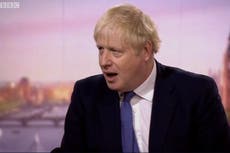Christmas might not be cancelled after all – but why weren’t other religions spared coronavirus rules?
Boris Johnson claims he will do what he can to make the festive period seem as normal as possible, but if restrictions are relaxed they should be for all faiths

A few days ago, an elderly Muslim couple told me how lonely Eid and Ramadan had been for them this year. They missed their children and grandchildren and they said it felt empty and so very lonely. They recognised, however, that it was more important to keep everyone safe and to do their bit to slow the rate of this awful virus. So they had their Eid lunch with their family through FaceTime.
But the prime minister recently seemed to indicate that he might suspend the "Rule of Six" for Christmas Day so the festive season could be "as normal as possible". In an ITV Anglia interview, Boris Johnson was asked whether he was saying that a family of five couldn’t have both grandparents round for Christmas lunch. He responded by saying: “We’re not saying that at all. We’ll do everything we can ... everything we can to make sure that Christmas for everybody is as normal as possible.”
Many people are questioning why, if the government does suspend the “Rule of Six” on Christmas Day, this was not the case for other religions? After all, Covid-19 has no religious bias.
Is the prime minister implying that people who celebrate Christmas are less likely to catch Covid-19, or that Christmas is a more important celebration than that of any other religion?
When Eid al-Fitr took place in May this year, Muslims were told that they could not get together with any other family members. Even though so many families had already made preparations. Then just before the beginning of Eid al-Adha at the end of July, they were told the same thing, even though the situation had improved and rules had been relaxed. In the same month, Hindus were also told that they could not celebrate Raksha Bandhan in the usual way. In September, the Jewish celebrations of Rosh Hashanah and Yom Kippur were also subjected to the same rules.
One might argue that the first Eid celebration took place during the initial nationwide lockdown; a time when the virus appeared to be spiralling out of control and there were fears that frontline services might not be able to cope. And admittedly, the rules also applied at Easter, which for Christians is a more important celebration than Christmas.
But Christmas is celebrated by more people, including those of no faith, who see it as a period to give and receive, and spend quality time with extended family members and friends.
You only have to look at the crowds gathering on the streets after the 10pm pub curfew to know that people of all religions and none are equally capable of ignoring the government guidelines.
Instead and more importantly, therefore, what we should be looking at is the rate at which Covid is spreading. Given that the latest UK R rate rose to between 1.3 and 1.6, it seems absurd that the rules should be relaxed, even for one day, especially since the elderly are more likely to die from Covid and they will be the ones breaking isolation to be with their families.
A government source said: “The PM is anxious to avoid being portrayed as Scrooge.” I grew up in Charles Dickens’s hometown, I can’t imagine why any reasonable family would want to give their parents Covid as a Christmas present.
Join our commenting forum
Join thought-provoking conversations, follow other Independent readers and see their replies
Comments


Bookmark popover
Removed from bookmarks